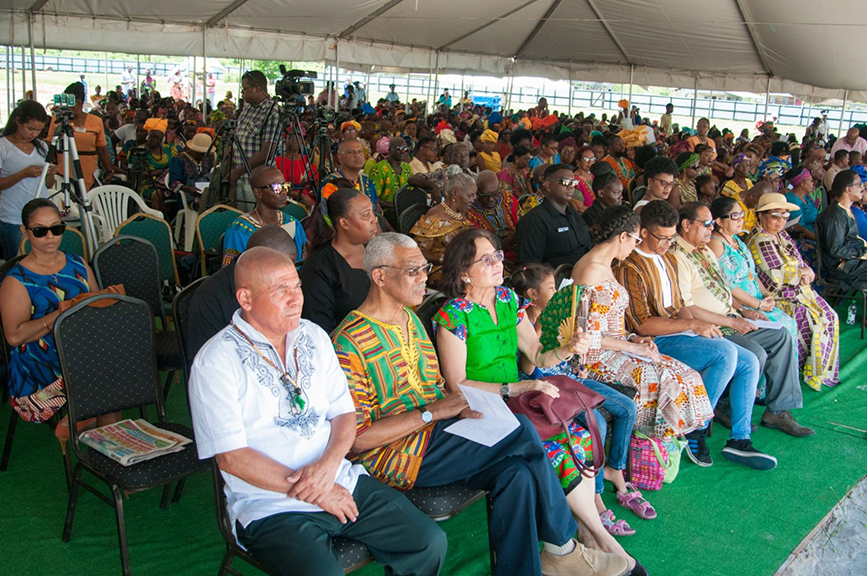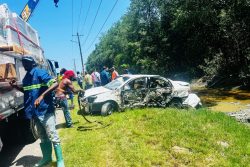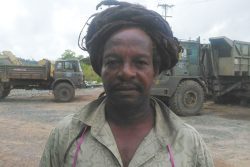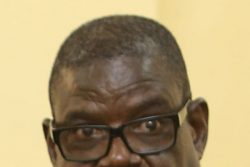President David Granger has declared the next ten years – 2020-2029 –a decade of development during which oil revenues will be used to fund free education from Nursery to Tertiary levels for all Guyanese.
“Our expected petroleum revenues, apart from what would be devoted to our Sovereign Wealth Fund, will help us to restore education in accordance with our Constitution. Those resources belong to future generations and future generations will benefit and profit from being educated. This would be an educated nation,” the Head of State told attendees at this year’s National Emancipation Festival held at the No.53/Union Village, East Berbice-Corentyne (Region Six).
The broad nature of the President’s statement would raise continuing concerns that the government is acting outside of the caretaker status assigned to it by the constitution and the Caribbean Court of Justice.
Stressing that Guyana must not be a nation of a few rich people and very poor, uneducated people the President committed to developing a schools in every village.
‘This national decade of development I speak about must ensure that at least one school is established in every village…I want to see a primary school in every single village. There must be a place for every child in school in Guyana. Every child must be able to get to school by road or by river,” he said, noting that no child must be hampered by their parent’s financial inability to send them to school while referencing the Public Education and Transport Service (PETS) launched four years ago.
The programme also known as the three B’s (Bus, Boats and Bicycles) has so far provided 29 buses, 12 boats and more than 1,400 bicycles to ensure children across the ten administrative regions are able to attend school on a daily basis.
“My brothers and sisters, every citizen, every Guyanese has a right to education. This is a basic entitlement of all of us, all of our children. Free education is an entitlement mandated by our constitution which states `every citizen has the right to free education from nursery to university,’” he reminded, adding that every school student should be taught science, technology, engineering and mathematics (STEM) as the public education system must equip students for the knowledge-based societies of the future.
He further highlighted the need for an expansion to the National Endowment for Science and Technology (NEST) which, over the past four years, has been providing grants for the improvement of schools’ science laboratories.
Additionally, he called for an expansion of the Guyana Youth Corps between 2020-2029 to ensure that boys and girls who leave school without matriculating- from the coastland and hinterland- are given an opportunity to be trained to re-enter the world of work.
Acknowledging the impact of emancipation on African-Guyanese the President reminded that they supported the establishment of social institutions for education and religious instruction, including by providing lands for the establishment of churches and schools and embraced education as a means of providing a better life for themselves, their families and future generations.
The Head of State took time to identify several African-Guyanese who were pioneers in providing educational opportunities during the last century.
He noted that Norman Cameron, a Berbician, was not only a mathematician, historian, educationist, essayist and dramatist, but he established his own school – the Guianese Academy as did the Costello brothers, Austin, Cosmo and Joseph, who established the Tutorial High School which provided education for children of low-income parents among others.
“Access to education created opportunities for the professional development of African-Guyanese. Their presence increased in public education, public administration, public health, public security and public information. Emancipated Africans employed their education to re-construct their world. Education was the gateway to their entry into every field of human endeavour and national life,” President Granger said.
He further said that African-Guyanese and their descendants have distinguished themselves in academia, agriculture, accounting, the arts, business, diplomacy, education, engineering, law-enforcement, legal services, medicine, politics, the public service, sport and trade unionism and other fields.
“African contributions are undeniable and ineradicable. Persons of African descent, however, still confront obstacles to their recognition, the pursuit of justice and to their development,” he added.









